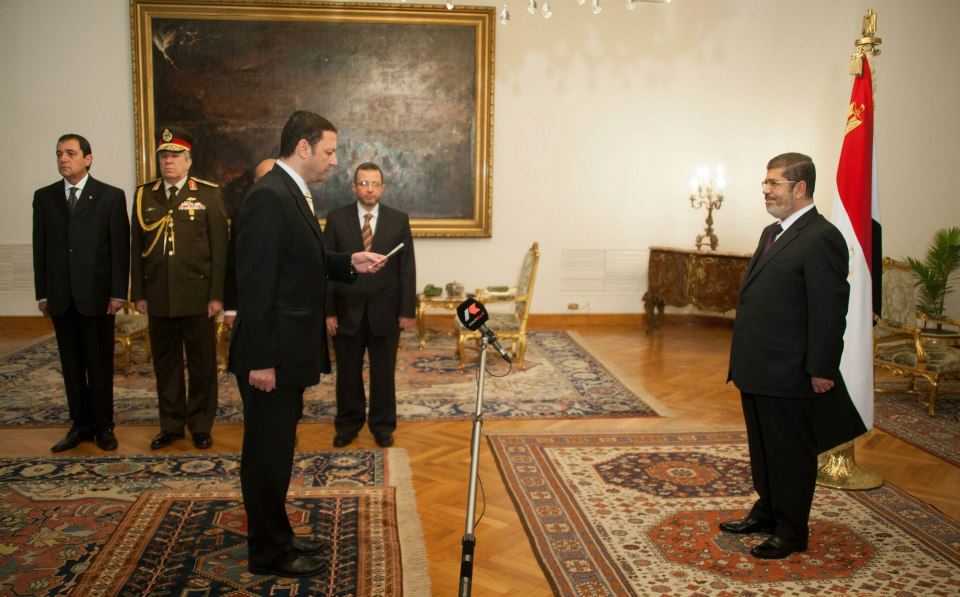CAIRO: Hosni Mubarak is still president of Egypt as he never signed a resignation letter, his lawyer asserted in court Sunday as he began wrapping up the defense case in the trial of the ousted strongman.
"Mubarak did not write a letter of resignation," Farid El-Deeb told the court.
"The document was signed by Omar Suleiman," Egypt’s former spy chief who was appointed by Mubarak as vice president during a popular uprising last year demanding that the veteran leader quit.
As a result, El-Deeb said, the Cairo criminal court is not competent to try Mubarak, who should be referred to a "special tribunal."
Mubarak stepped down on February 11 last year, pushed out of power after an 18-day revolt against his regime.
He has been on trial since August charged over the deaths of hundreds of protesters killed during the uprising. Being tried with him are his former interior minister and six ex-security officials.
The prosecution wants Mubarak to hang for the killings.
Mubarak is also facing charges of corruption along with his sons Gamal and Alaa in a separate trial in the same court.
The defense began on Tuesday a five-day challenge and is due to wrap up the case concerning Mubarak and his sons later on Sunday.
The trial will continue with defense teams for ex-interior minister Habib El-Adly and the six security officials arguing their cases. The last hearing is set for February 16.
The court is then expected to recess for deliberation after which the judge will set a date for the verdict.
During the Saturday hearing, El-Deeb told the court that there is not a shred of evidence linking the ousted Egyptian strongman to a controversial gas deal with Israel.
He said Egypt’s spy agency negotiated the 2005 deal in line with international norms.
"There isn’t an ounce of evidence that Mubarak was involved in the deal to import gas to Israel," costing the state $714 million (€553 million) in losses, El-Deeb told the court.
"Statements by the former head of the intelligence services, Oman Suleiman, ascertain that he was not involved in the pricing process or anything else concerning this deal.
"The negotiations concerning the export of Egyptian gas to Israel were carried out in accordance with international norms," El-Deeb added.
Mubarak is charged with approving the gas agreement with Israel. Prosecutors say it was a bad deal for Egypt and allowed businessman Hussein Salem to make illegal profits.
Salem was a major shareholder in East Mediterranean Gas (EMG), which carried out the exports. Egyptian opposition groups long complained that EMG sold gas at preferential prices to Israel and other countries, costing Egypt billions of dollars in lost revenue.
A court that handed Salem a seven-year prison sentence in absentia in October said he and his family laundered more than $2 billion from the sales.
El-Deeb argued that former oil minister Sameh Fahmy, who is behind bars for his alleged involvement in selling Israel gas below market value in a bid to make illicit gains, got the greenlight for the deal from the former government.
"Mubarak was not involved at all in these details," he said.
Egypt supplies 43 percent of Israel’s natural gas, which generates 40 percent of Israeli electricity. The flow of gas was interrupted several times last year by repeated militant attacks on the pipeline in the Sinai desert.
The sale of gas to Israel, which signed a peace treaty with Egypt in 1979, has always been controversial in the Arab world’s most populous country.
The Egyptian oil ministry said last year it will revise the deal and would substantially increase the price.
In December 2010, four Israeli firms signed agreements with EMG to import gas under a 20-year contract valued at $5 billion-$10 billion.
Terms of Egyptian gas sales to Israel and Jordan have been reviewed since Mubarak’s overthrow but supplies have faced repeated disruption from attacks on the pipeline running through the Sinai border region. No group has claimed responsibility.
Egyptian authorities foiled a fresh attempt to blow up the pipeline on Saturday, security sources said, four days after the authorities announced the link was being reopened on a trial basis.
As with previous attacks, security officials blamed the attack on "an anonymous militant group."
At least eight saboteurs tried to place a bomb underneath the pipeline but residents spotted them and alerted the armed forces, who arrived quickly, said one security source. He said the militants escaped after an exchange of gunfire.

